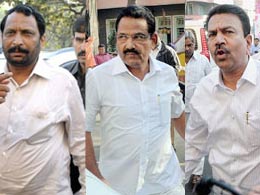
During middle of February 2012, BJP ruled Karnatka’s two ministers, Laxman Savadi and C C Patil were watching the porn clip on the mobile belonging to another minister Krishna Palemar. All three had to resign the job and BJP huddled in to a Chintan baithak (Meeting for Introspection) to do the damage control. Whether these BJP ministers are also RSS trained swayamsevaks, like most top functionaries of BJP are, is not known. But surely these porn watching ministers do come under the broad umbrella of RSS combine, popularly known as Sangh Parviar.
There are many other incidents about those in the ambit of RSS combine, in incidents which involve gender related issues. By now the aggression of Pramod Mutalik’s Sri Ram Sene attacking and humiliating the girls in a pub is too well known. Mutalik is a RSS trained person. He joined RSS in 1975 and became convener Bajrang Dal for South India in 2004. He also helped BJP’s election campaigns. Later he joined Shiv Sena before forming his own Sri Ram Sene. The attacks on those celebrating Valentine day, by Shiv Sena, Sri Ram Sene and other groups who are fellow travelers of RSS politics is a sort of annual ritual.
Many of these elements have been attacking Muslim boys who were found conversing with Hindu girls. In Gujarat, Babu Bajrangi, who was very active in Gujarat anti-Muslim pogrom, who was caught in the Tehelka sting operation boasting about playing the ‘One day match’, killing the Muslims, was also the leader of a squad which was intimidating the couples in the parks. The most systematic attempt to combine gender issues, patriarchal norms with anti Muslim tirade manifested in the form of the propaganda about ‘Love Jihad’, a hoax deliberately floated to browbeat Muslim youth has been seen in many a places particularly in Kerala. As per this propaganda Muslim youth are being given money and training to lure way Hindu girls with the aim of increasing Muslim population.
The pathological dislike for the girls trying to get autonomy in choosing their life partners is being opposed in many a ways. The couples meeting the in the public places are advised to abhor love marriage and to go for the partners selected by their parents. As a counter to Valentine day celebration, Asaram Bapu suggested the celebration of Matri Pitru day (Parents Day) on that day (14th February, the Valentine Day) and the BJP ruled Chhattisgarh Government has implemented this wish of Asaram Bapu and Matri Pitru day was observed in Chattisgarh this year. To cap it all the norms, morality and values followed by RSS combine were most in display in response to the statement of the Hyderabad police Chief Dinesh Reddy’s statement. Mr. Reddy (Dec 2011) linked the rape cases with the dress of women. Not the first time any police person or many others have said a similar thing. The difference this time was that when Mr. Reddy was being criticized for his crass statement, he received support from the un-expected or rather expected quarter of one women’s organization. This women’s organization happens to be Rashtra Sevika Samiti, an organization subordinate to Rashtriya Swayamsevak Sangh (RSS). While most of the incitements which have been observed are a manifestation of perverted sense of morality, a medieval mind set, the Rashtra Sevika Samiti’s support to Mr. Reddy in linking up women’s dress with rape, in turn holding them responsible for the crimes done against them, is very revealing.
The likes of Babu Bajrangi, Promod Mutalik may be dismissed as fringe elements, despite their association with RSS or its affiliates, and the porn clip watching BJP ministers may not be an exception in doing such a thing. But in the case of Rashtra Sevika Samiti’s action the attitude of RSS ideology toward women becomes more than explicit. RSS is an exclusively male organization. In 1936 Laxmibai Kelkar, a woman related to RSS members’ family, approached the then Sarsanghchalsk and asked permission to join the RSS. She was declined the membership on the ground that RSS is only for men. She was advised to start Rashtra Sevika Samiti instead. The nomenclature of the two organizations is very interesting. The dominating male organization has the word Swayam (self), while in the name of women’s organization the word Swayam (self) is missing, showing their subordinate position.
This deep adherence to patriarchy dictated by RSS keeps coming to surface time and over again. In the decade of 1980s the then BJP’s Vice President Vijaya Raje Schindia had supported the women committing Sati (self immolation by woman after husbands’ death), in response to the Roopaknwar Sati case. She asserted that Sati is a great glorious Hindu tradition. She also said that to commit sati, is the right of Hindu women. Somehow she herself never exercised this right herself!
Another major leader of BJP, Mridula Sinha, belonging to BJP Mahila Morcha (BJP Women’s Wing) had in an interview given to the Savvy Magazine in 1994 defended the wife beating and dowry. She said that women should not work outside unless there is a dire financial crisis’ in the family. The major ideologues of Sangh combine have talked gloriously about Manu Smiriti, the tome which ordains the caste system and subordinate position of women. The open preaching of patriarchal values is a core agenda of most of the communal organizations, irrespective of to whichever religion they belong to. RSS combine exemplifies it to the hilt, starting from its nomenclature to the ideology and practices undertaken by this multi headed hydra. In these matters the attitude of other fundamentalist organizations, deriving their legitimacy from Islam or Christianity may not be much different and they may hold hands together on such issues, the way they stood together on the issue of same sex relationships.
Our society during the period of 1950-1970s saw the strengthening of the process of caste and gender transformation. The period from 1980s has been a sort of reversal of the healthy elements of the process of social change. This reversal of the process of social transformation is an accompaniment of the rise of politics in the name of religion, the politics of RSS in India. While porn watching BJP ministers may not be the only ones’ in doing what they did, there is a need to look at the attitude to gender which is on display due to the politics of RSS, the Hindutva.








Comments
Add new comment